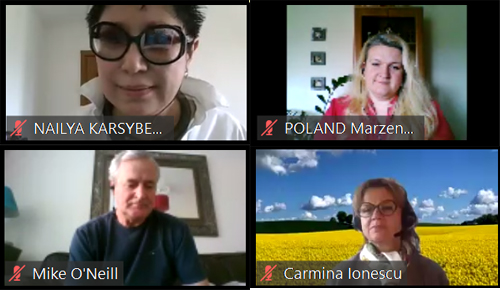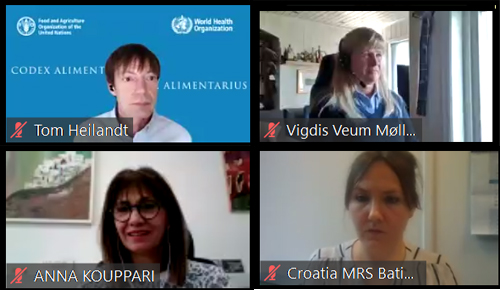The CCEURO Region - Regional Coordinator Germany
In 1964, at its second session, the Codex Alimentarius Commission established the Coordinating Committee for Europe to succeed the 'European Council of the Codex Alimentarius' and to replace the 'Advisory Group for Europe' set up at its first session in 1963.
The first meeting of the Coordinating Committee for Europe took place in July 1965 in Berne, Switzerland and was attended by 16 countries from the region.
The current coordinator, Germany, is based in the Federal Ministry of Food and Agriculture (BMEL).
Germany’s main priorities as coordinator are to:
- reduce barriers to active participation of Members of the region in Codex work;
- increase the awareness of the role of Codex and food safety in general in the transition towards sustainable food systems; and
- promote the use of Codex standards in priority areas such as antimicrobial resistance (AMR).
In addressing these priorities, the coordinator will use synergies from international and regional level activities of the Codex Secretariat, FAO and WHO as well as Codex Observers.
CCEURO Coordinator
All information on Codex is public and free
For regional enquiries contact:
CCEURO Secretariat
German Federal Ministry of Food and Agriculture
Wilhelmstrasse 54, 10117 Berlin, Germany
Tel :+49 30 18 529 4065
Email: [email protected]
Codex Euro Region responds to the challenge of cancelled meetings
If you review the history of Codex committees since 1963 there are occasional gaps in the meeting schedule and most of these in the early years of Codex as the programme gradually developed and expanded. Some committees do not meet every year and so the average number of sessions through the 1970s, 80s, 90s and up to the present day has grown from less than 10 in any calendar year up to 20 in 2019.
What then to make of the abrupt halt in physical meetings caused by the COVID-19 pandemic and how can Codex reinvent itself to continue to develop international food safety standards when experts are unable to meet in person?
Staying in touch
Opening an online informal meeting of the FAO/WHO Coordinating Committee for Europe (CCEURO), attended by 21 countries, the European Union, FAO/WHO and the Codex chairperson and vice-chairpersons, Nailya Karsybekоva, Regional Coordinator, Kazakhstan said the unexpected challenges caused by COVID-19 pandemic had prompted the Codex community to rethink their ways to stay in touch with each other.

Nailya Karsybekоva, Marzena Chacińska, Mike O'Neill, Carmina Ionescu
Codex Secretary, Tom Heilandt outlined in detail the current status of Codex meetings and ongoing discussions regarding the next Commission and Executive Committee. “We have to learn by doing but always keeping in mind our principles of inclusivity, transparency, consensus-building and collaboration. We also have to be creative, in my opinion, while upholding these principles”.
Finding solutions with global acceptance.
At CCEURO food regulators and technical experts carry out significant work on food standards issues and discuss common food safety and quality challenges and priorities of importance to the region.
“We really appreciate the opportunity to have an informal discussion among the CCEURO members. The COVID-19 crisis demonstrates yet again the relevance of Codex work in facilitating world food trade“, said Marija Batinić Sermek, Croatia.
“I think in this pandemic situation every online meeting is very useful, we can see how our colleagues from different countries cope with actual difficulties”, said Krisztina Frányó, Hungary. According to Marzena Chacińska, Poland, the meeting was “a very good sign and confirmation that we need to exchange information, stay in touch, plan our work and maintain continuity in priority areas for the region as well as for the Codex as a whole”.
Dirk Lange, European Union, explained that in these challenging times “it is important to discuss issues of common interest so that the regional coordinator is aware of the positions and concerns of the region when representing CCEURO”.
Members from the region greatly valued the opportunity to hear Codex Secretary Tom Heilandt set out the short and long term plans to organize and carry forward existing and new work if there are to be no physical meetings in 2020. “I particularly appreciated his step by step explanation on how the next Commission could move forward standards on what is known as a ‘non-objection’ basis”, said Carmina Ionescu, Sweden. “We need to share thoughts and ideas to solve problems together on a global basis, finding solutions with global acceptance”, she said.
Vigdis S. Veum Moellersen, Norway, said how useful it had been to meet the members in the region online. “I like that we all have the same information at the same time and that we were able to openly exchange views on possibilities for dealing with food safety issues on the Codex agenda also when not having physical meetings”.
Some Members like Anna Kouppari, Cyprus were using this type of online technology for the first time. “I am very pleased to say that it worked perfectly well and I believe that with the support of such virtual meetings and of course with the valuable and dedicated work of the Codex Secretariat, Codex will be able to move forward despite the cancellation of the physical meetings”.

Tom Heilandt, Vigdis S. Veum Moellersen, Anna Kouppari, Marija Batinić Sermek
Without physical meetings, everything changes.
“The Codex Alimentarius Commission, like all institutions and organizations needs to re-think its way of working in the short term due to the inability to convene physical meetings” said Mary Kenny, FAO. In coming up with alternatives, and interim arrangements to ensure Codex technical work can advance, it will be important to consider the capacities and needs of all Codex members, coupled with clear communication on any new ways of working, in order to ensure effective and as broad a participation as possible.
Peter Hoejskov, WHO, described how current restrictions on travel and mass gatherings affect formal as well as informal networking and personal relations between food safety regulators and experts. “Our concern is that at this moment we do not see how the procedures of the physical meetings will be applied … how discussions will be structured and how consensus can be reached, which is often a complicated and lengthy process even in physical sessions”.
“Without physical meetings, everything changes. I’m particularly concerned about participation levels, both now and in the future, as many Codex members are being asked by their governments to prioritize other work”, said Mike O’Neill, United Kingdom. “I see the lack of clear procedures and guidance for working without physical meetings or by correspondence as the biggest challenge”, said Niklas Schulze-Icking, Germany.
A glimpse of the future for Codex.
Those in the meeting described how they hoped to take advantage of rapid communication technologies and how electronic tools could ease and increase the participation in topics of interest. “I’m pleased that we are already test driving some of the remote working tools which perhaps serve as a glimpse of the future for Codex. One of the challenges ahead will be integrating remote participation with physical meetings when they eventually restart”, said O’Neill.
“In order to maintain progress, we need to consider which Codex topics could be completed, which new work proposals could be agreed and where we have the potential to move forward in these new circumstances”, said Marzena Chacińska.
Hilde Kruse, Senior Food Standards Officer in the Codex Secretariat said: “It was clear that the participants appreciated the opportunity to meet virtually, and to get firsthand updates regarding the rescheduling of Codex meetings and the measures being taken to continue Codex work. The informal call demonstrated Members’ commitment and it was also fascinating to experience how a virtual meeting with interpretation and video could bring Members together.”
Learn more
The 32nd session of the committee will be co-hosted by Germany.










Leave a comment